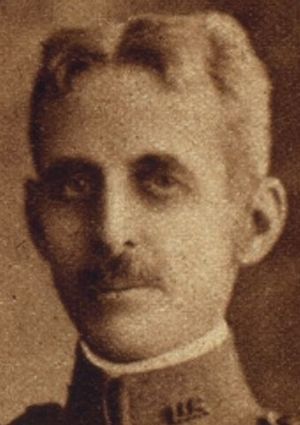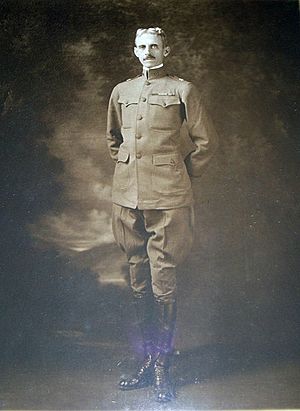Evan M. Johnson facts for kids
Quick facts for kids
Evan M. Johnson
|
|
|---|---|

From 1919's The War of the Nations: Portfolio in Rotogravure Etchings
|
|
| Born | September 26, 1861 Brooklyn, New York U.S. |
| Died | October 13, 1923 (aged 62) Paris, France |
| Buried | |
| Allegiance | United States |
| Service/ |
United States Army |
| Years of service | 1882–1922 |
| Rank | Brigadier General |
| Unit | U.S. Army Infantry Branch |
| Commands held | 3rd Battalion, 29th Infantry Regiment 19th Infantry Regiment 5th Infantry Regiment 29th Infantry Regiment 154th Infantry Brigade 77th Division 158th Infantry Brigade 79th Division |
| Battles/wars | Apache Wars Spanish–American War Philippine–American War United States occupation of Veracruz World War I |
| Awards | Croix de Guerre (France) Legion of Honor (Officer) (France) Order of Saints Maurice and Lazarus (Commander) (Italy) |
| Spouse(s) | Bessie Seaman (m. 1896-1915, div.) |
| Children | 3 |
Evan M. Johnson (born September 26, 1861 – died October 13, 1923) was a dedicated officer in the United States Army. He served in many important conflicts. These included the Apache Wars, the Spanish–American War, the Philippine–American War, and the occupation of Veracruz. He is most remembered for his leadership during World War I. In that war, he commanded the 154th and 158th Infantry Brigades. He also led the 77th and 79th Divisions.
Contents
Early Life and Education
Evan Malbone Johnson was born in Brooklyn, New York on September 26, 1861. His father, also named Evan M. Johnson, was a Union Army captain during the American Civil War. His father later became the city controller for Brooklyn. Evan Johnson attended public schools in Brooklyn. He also went to the Alexander Military Academy and the Brooklyn Polytechnic Institute.
Starting a Military Career
Evan Johnson decided he wanted to be a soldier. In December 1882, he joined the United States Army. He was not yet old enough, so he used a different name, James Scarlett. He started as a private in the 10th Infantry Regiment. By January 1885, he had become a sergeant.
In August 1885, Johnson passed a test to become an officer. He was made a second lieutenant in the Infantry. He stayed with the 10th Infantry. In 1889, he finished training at the Infantry and Cavalry School in Fort Leavenworth, Kansas. From 1891 to 1894, he taught military science at Mount Union College. He was promoted to first lieutenant in 1892. He then joined the 19th Infantry. In 1895, Johnson fought in the Apache Wars in Arizona and New Mexico.
Continuing His Service
In 1898, Johnson's unit, the 19th Infantry, went overseas for the Spanish–American War. He fought in Puerto Rico. He also helped govern the province of Adjuntas. In March 1899, he became a captain.
Johnson was promoted to temporary major in July 1899. He joined the 29th Infantry. This regiment served in the Philippines during the Philippine–American War. He led the 3rd Battalion and fought in several areas. Johnson also led a mission against Filipino fighters on Tablas Island. From March to October 1901, he served as governor of Romblon province.
In 1905, Johnson wrote an article called "The Enlisted Man's Contract With the Government." It was published in a military journal. His article was very good and won a Silver Medal. From 1906 to 1908, he served again in the Philippines. In 1908, he became a major and joined the 6th Infantry.
In 1910, Johnson attended the United States Army War College. He finished his studies in 1911. After that, he worked as an instructor and advisor for the New Jersey National Guard. From 1912 to 1914, Johnson was also the editor of the Infantry Journal. In 1914, Johnson participated in the United States occupation of Veracruz in Mexico. He commanded the 19th Infantry Regiment. In August 1914, he was promoted to lieutenant colonel.
World War I Service
In July 1916, Johnson became a colonel. He commanded the 5th Infantry Regiment. He prepared his regiment for the U.S. entry into World War I. In 1916, he was sent to Panama to command the 29th Infantry Regiment.
In August 1917, he was promoted to brigadier general. He was given command of the 154th Infantry Brigade, part of the 77th Division. Johnson fought with this division in France. He sometimes served as the acting division commander. In October 1918, when the Lost Battalion was surrounded, Johnson personally led an attack to try and rescue them. He was wounded during this battle.
In late October 1918, Johnson was assigned to command the 158th Infantry Brigade. This unit was part of the 79th Division. He led this brigade until the war ended. He also acted as the division commander on several occasions.
After the War and Retirement
In 1919, Johnson returned to his permanent rank of colonel. He was assigned as the U.S. military attaché in Rome, Italy. A military attaché is an expert who advises on military matters in another country. Johnson was fluent in Italian, which helped him greatly in this role. He served there until 1922, when he asked to retire.
Awards and Honors
Johnson received several important awards for his service:
- The French Croix de Guerre for his bravery in World War I.
- The French Legion of Honor (Officer rank) for his wartime service.
- The Italian Order of Saints Maurice and Lazarus (Commander rank) for his work while stationed in Rome.
Later Life and Passing
Evan Johnson was involved in several organizations. These included the Military Order of the Loyal Legion of the United States and the Sons of the American Revolution. He was also active in the Freemasons.
Johnson passed away in Paris, France, on October 14, 1923. He was buried at the Suresnes American Cemetery and Memorial in Suresnes, France. In 1930, the U.S. Congress passed a law. This law allowed World War I generals to retire at their highest rank. Because of this, Johnson's rank of brigadier general was officially restored after his death.
Family Life
In 1896, Evan Johnson married Bessie Seaman. They had three children: Elizabeth, Cornelia, and Evan.
Images for kids
 | Janet Taylor Pickett |
 | Synthia Saint James |
 | Howardena Pindell |
 | Faith Ringgold |



